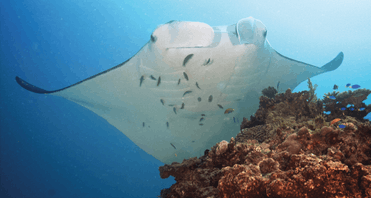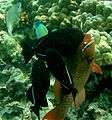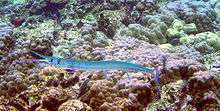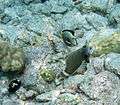Cleaning station
A cleaning station is a location where aquatic life congregate to be cleaned by smaller creatures. Such stations exist in both freshwater and marine environments, and are used by animals including fish, sea turtles and hippos.[1]

The cleaning process includes the removal of parasites from the animal's body (both externally and internally), and is performed by various smaller animals including cleaner shrimp and numerous species of cleaner fish, especially wrasses and gobies (Elacatinus spp.).
When the animal approaches a cleaning station, it will open its mouth wide or position its body in such a way as to signal that it needs to be cleaned. The cleaner fish will then remove and eat the parasites from the skin, even swimming into the mouth and gills of any fish being cleaned. This is a form of cleaning symbiosis.
Cleaning stations may be associated with coral reefs, located either on top of a coral head or in a slot between two outcroppings. Other cleaning stations may be located under large clumps of floating seaweed or at an accepted point in a river or lagoon.
Some species of combtooth blenny, most notably the false cleanerfish, mimic the appearance and behaviour of cleaners, then tear away scales or flesh when suitably close to the victim.
Gallery
.jpg) Stenopus hispidus banded cleaner shrimp on a Xestospongia muta barrel sponge: The shrimp wait to remove external parasites and dead skin from visiting fish clients.
Stenopus hispidus banded cleaner shrimp on a Xestospongia muta barrel sponge: The shrimp wait to remove external parasites and dead skin from visiting fish clients. A parrotfish being cleaned by Hawaiian cleaner wrasses, Labroides phthirophagus (photographed in 2005 in Hawaii)
A parrotfish being cleaned by Hawaiian cleaner wrasses, Labroides phthirophagus (photographed in 2005 in Hawaii) A needlefish being cleaned by L. phthirophagus
A needlefish being cleaned by L. phthirophagus- A Hawaiian cleaner wrasse inside the gill of a pufferfish
 An orangespine unicornfish being cleaned by a Hawaiian cleaner wrasse
An orangespine unicornfish being cleaned by a Hawaiian cleaner wrasse A rockmover wrasse gets cleaned by a Hawaiian cleaner wrasse while an orangespine unicornfish waits its turn
A rockmover wrasse gets cleaned by a Hawaiian cleaner wrasse while an orangespine unicornfish waits its turn A goatfish, Mulloidichthys flavolineatus, at Kona, Hawaii, being cleaned by two Hawaiian cleaner wrasses
A goatfish, Mulloidichthys flavolineatus, at Kona, Hawaii, being cleaned by two Hawaiian cleaner wrasses
See also
- Doctor fish
- Lysmata amboinensis
References
- Hroch, Tomas. "Mzima Springs - Haunt of the hippo". eng.hrosi.org. Archived from the original on 12 November 2013. Retrieved 27 July 2014.
- McGregor, Peter K. Animal Communication Networks . Cambridge University Press, p. 525
- Ryan, Frank (2002). Darwin's Blind Spot: Evolution Beyond Natural Selection. Houghton Mifflin Harcourt. ISBN 0618118128.
- Hammerstein, Peter (2003). Genetic and Cultural Evolution of Cooperation. MIT Press. ISBN 978-0262083263.
- Bauer, Raymond T. (2004). Remarkable Shrimps: Adaptations and Natural History of the Carideans. University of Oklahoma Press. ISBN 978-0806135557.
| Wikimedia Commons has media related to Cleaning station. |